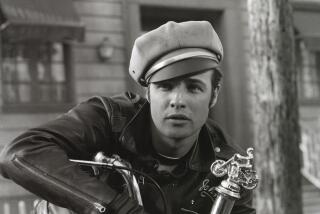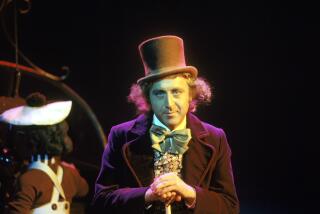Remembering Gene Wilder: In (not-quite) defense of âSilver Streakâ
The death of Gene Wilder at age 83 has prompted a justifiable outpouring of love for his movies: âBlazing Saddles,â âWilly Wonka & the Chocolate Factoryâ and other repositories of his controlled zaniness. Wilder had a trove (if not nearly a large enough one) of classic comedic performances, also including âThe Producersâ and âYoung Frankenstein.â Monday was a rough day for those who recall what was lost and see no immediate heir on the horizon.
The movie that popped up in my mind when the news came, though, was a different one than those hits: âSilver Streak,â the train-heist buddy comedy that marked the first of Wilderâs four collaborations with Richard Pryor. My father, a key figure in my early film education and a man Iâm lucky to return the favor to in my current life phase, showed me âSilver Streakâ when I was a child. I recall being giddy with excitement at the story centered on a train from Los Angeles to Chicago â the sheer exuberance of its plot, the combustible chemistry of its two stars.
It also seemed liked a timely memory for other reasons. The movie was directed by Arthur Hiller, the prolific filmmaker who died just this month at 92. And this fall, âSilver Streakâ â about Wilderâs book-publisher George, whoâs caught up in an art heist and must team up with Pryorâs small-time criminal Grover âwill celebrate its 40th anniversary.
So I got online and watched it â for the first time in three decades â in the hope of feeling anew the excitement I experienced as a child.
It was a good plan, anyway.
Hereâs the thing about âSilver Streakâ: It doesnât hold up well. Not at all.
Most obviously, there are the sensitivity issues. Yes, the idea of pairing a black and white star was relatively novel in the mid-â70s. So give it some points for that. But on race and other social matters, the film can be awkward, even cringe-y. Most notoriously, thereâs a blackface scene in which Wilder dons dark shoe polish and a jive-turkey walk to bypass cops at a Midwestern rail station. (That the filmmakers seem to think that Grover suggesting the idea to a reluctant George â invoking Al Jolson in doing so â makes it better in a way only makes it worse.)
The N-word is also uttered several times in the film. A woman is unceremoniously slapped. Said woman (the late Jill Clayburgh) is given so little to do that if one were to apply the Bechdel test it might actually get a negative score. Rosalind Russell material this ainât.
But even if you donât view âSilver Streakâ through that particular modern lens, the film has major tonal and genre issues.
A comedy action-thriller is a tough juggle to begin with. But the vibe here is so all over the place it canât fairly be called madcap â just mad.
What begins as a moody noir turns into a Hitchcockian potboiler (scheming men in hats, lots of running through narrow aisles, etc), then moves to intimate buddy comedy when Wilder and Pryor team up and begin plotting to knock off bad guys.
Thatâs already a lot of spinning plates. But many of these beats are then interrupted with moments of left-field screwball and slapstick. Wilder is constantly getting tossed off the train, in what is just the start of the broad gags. Thereâs a (sort-of) effective âWhoâs On First?â knockoff with a simpleton sheriff, and a scene with some kind of androgynous old farmer that involves double entendres and visual puns of cow-milking. (Donât ask. Really). These are periodic digressions from the deadly serious plan of the art heist back on the rails, from which the film never seems fully willing to deviate.
By the time âSilver Streakâ culminates in an overlong action finale and a runaway-train homage, youâre already so confused about why this is all happening and wondering who was stoned when they made it, you barely register the fleet of helicopters that has come in, seemingly pre-figuring scenes out of âThe A-Team.â
The movie actually climaxes with a train plowing through a Chicago train station in an unnecessarily big effects scene, and then epilogues with â I kid you not â Grover cruising through said station in a yellow convertible he happened to pick up from a display area. Yeah, itâs that kind of movie.
But hereâs the thing. My fond memory of âSilver Streakâ was still viable. It just had very little to do with the movie and everything to do with Wilder.
At nearly every moment heâs on-screen, heâs either doing something that helps you believe the action or makes it all so slyly funny you donât care that you donât believe it.
Remarkably, Wilder is playing the straight man (as opposed to Pryor, who shows up halfway through and is more clearly playing the duoâs comedic half) yet somehow manages to sneak in all manner of playfulness just the same. In the first few minutes, he already gets in a great comic jab when he tells a woman her perfume is excellent and then gives a little cough as soon as he passes that suggests what he really thinks.
When he spots a wanted poster of himself at a train station, in what should be a heightened moment of panic, Wilder instead drolly offers a gem. âThatâs my driverâs license picture.â Pause. âI hate that picture.â What should have been broad and silly becomes a quietly clever quip.
Wilder is constantly doing things like this. He has an almost counter approach, running against whatever action lies in front of us. George is an upscale educated sort, but Wilder manages to make this subtly funny, perhaps most notably after his failed bid at a car chase, when he turns to Pryor and says, in a perfectly patrician deadpan, âWould you like to drive for a while?â Scenes that are broad seem a little more plausible thanks to a human twinkle; moments that could be too self-serious are disrupted by his mania. Wide eyes have never been used to such notable effect; itâs as if theyâre somehow reacting to the scene and letting us in on the silliness all at the same time.
And indeed, there are those expressions. Wilderâs face almost seems to contain a great joke that he â you know and he knows â is going to take its time getting delivered to you. The comparison might be to a kind of tantric comedy, the fact that itâs perched on the edge for so long somehow making the release that much sweeter. Georgeâs interactions with Clayburgh both literally and figuratively fit this theme. The setup that he publishes sex books is strategically dangled, so that when he finally parries the line âI have a confession to make â Iâm much better at books on gardening,â itâs that much funnier.
What was truly surprising to me watching âSilver Streakâ now was not just what a mess the movie was or even how good Wilder was â itâs how much the power of the latter could overcome the former. Itâs as if at some point you stop caring about the movieâs badness because Wilder is just that strong. (OK, mostly stop caring about it.)
One suspects that Wilder, reading the script and wondering what exactly he was getting himself into, felt the same way. âStop dwelling on the ridiculousness,â you can imagine him saying to himself, âand just go with it.â
Even more, however, than not caring about the sloppiness of a movie like this, we stop remembering it in the first place. Itâs possible I thought âSilver Streakâ was good because I had simply forgotten the movieâs problems through the haze of the years. But itâs equally likely that it was Wilderâs performance that had done the trick â triumphing, slowly but surely, over my memory of how bad it was, each year a little more of his genius slowly erasing from my mind a few more of the problems.
That may be an actor like Wilderâs greatest skill. Itâs not just that he can elevate a scene or ground a scene or make a scene that had no right working a veritable classic. Itâs that in changing the nature of the movie, heâs able to change our memory of it too.
See the most-read stories in Entertainment this hour Âť
On Twitter: @ZeitchikLAT
More to Read
Only good movies
Get the Indie Focus newsletter, Mark Olsen's weekly guide to the world of cinema.
You may occasionally receive promotional content from the Los Angeles Times.











